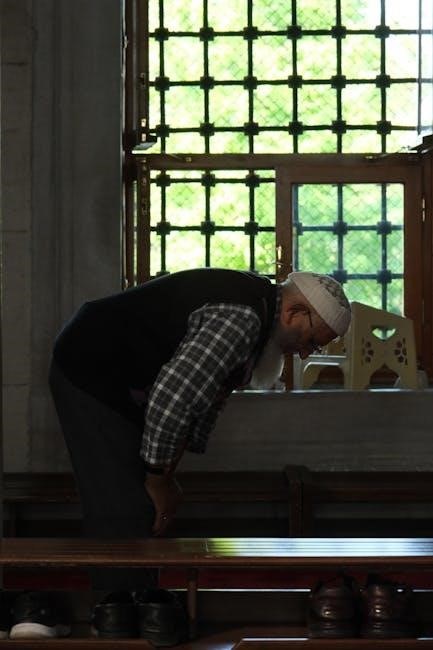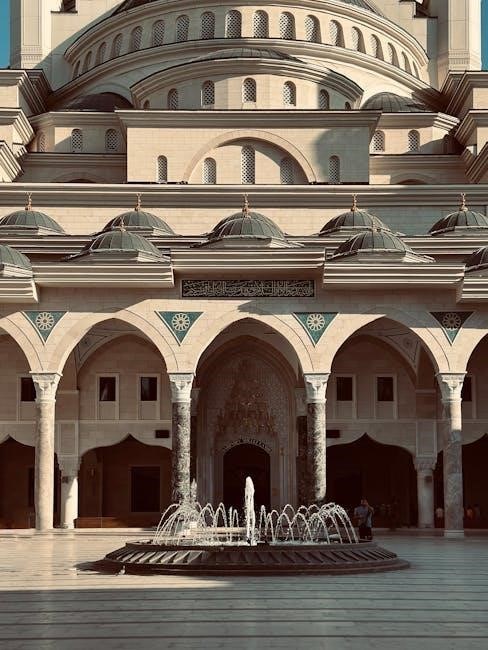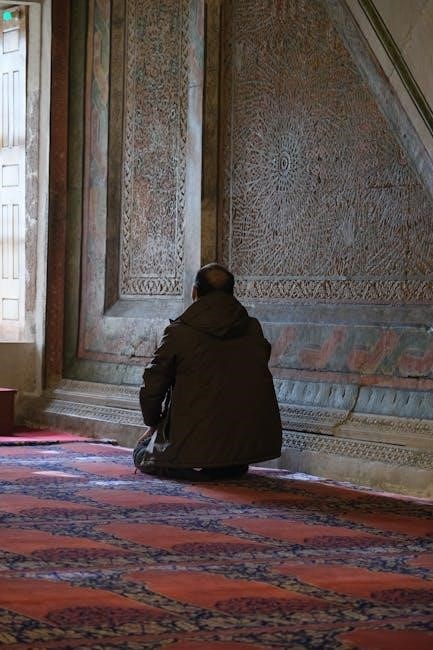The Yizkor Prayer is a meaningful memorial service recited four times annually during major Jewish holidays, honoring deceased loved ones. Its name, “Yizkor” (Hebrew for “May God remember”), reflects its purpose of remembering and commemorating the departed. The prayer is deeply rooted in Jewish tradition, offering comfort and a connection to ancestors. PDF resources provide accessible versions, often with Hebrew and English translations, along with commentaries, enabling participants to engage deeply with the service. These resources are widely available online, facilitating meaningful observance for those attending synagogue or reciting the prayer at home, ensuring the legacy of remembrance endures.
Definition and Purpose
The Yizkor Prayer, meaning “May God remember” in Hebrew, is a solemn memorial service dedicated to honoring the memory of deceased loved ones. Its primary purpose is to provide a moment of collective remembrance and comfort for mourners. The prayer serves as a way to connect with the departed, expressing faith in their eternal souls and seeking divine mercy. It is recited four times a year during significant Jewish holidays, offering a structured opportunity for reflection and healing. The Yizkor service includes specific prayers, such as El Malei Rachamim, and the recitation of names of the deceased, emphasizing both personal and communal loss; Its ultimate goal is to perpetuate the memory of loved ones while finding solace in tradition and community support.
Historical Background
The Yizkor Prayer traces its origins to the medieval Ashkenazi Jewish tradition, evolving as a formal memorial service over centuries. Its name, derived from the Hebrew word “Yizkor” (May God remember), reflects its core purpose of invoking divine remembrance for the deceased. Initially a private prayer, it gradually became an integral part of public synagogue services during major Jewish holidays. The prayer gained prominence as a communal expression of mourning and remembrance, particularly after significant events in Jewish history. Today, Yizkor is recited four times a year, primarily by Ashkenazi Jews, on Passover, Shavuot, Shemini Atzeret, and Yom Kippur, serving as a bridge between generations and a testament to enduring spiritual connection.
Significance in Jewish Tradition
The Yizkor Prayer holds profound significance in Jewish tradition as a sacred ritual of remembrance and communal mourning. It serves as a poignant way to honor deceased loved ones and connect with their memory, fostering a sense of continuity across generations. Recited during major holidays, Yizkor provides an opportunity for introspection and spiritual healing, reinforcing the bond between the living and the departed. Its emphasis on collective remembrance strengthens communal ties, while its liturgy offers comfort to mourners. The prayer’s role in preserving Jewish heritage and upholding the legacy of ancestors ensures its enduring importance in Jewish religious and cultural life, making it a vital part of observance and identity.

When is the Yizkor Prayer Recited?
The Yizkor Prayer is observed four times annually: on the last day of Passover, the second day of Shavuot, Shemini Atzeret, and Yom Kippur, aligning with Torah readings and emphasizing remembrance and communal reflection.
Passover (Pesach)
The Yizkor Prayer is recited on the last day of Passover, following the Torah reading. This service honors the memory of deceased loved ones and reflects on the Exodus from Egypt. The prayer serves as a poignant reminder of the cycle of life and the enduring connection to Jewish heritage. PDF resources for Pesach Yizkor include Hebrew and English texts, enabling participants to follow the service meaningfully. These materials often feature commentaries and explanations, enriching the spiritual experience. Reciting Yizkor during Passover strengthens the bond between the living and the departed, fostering a sense of communal remembrance and healing. This tradition is deeply ingrained in Jewish practice, ensuring the legacy of loved ones endures.
Shavuot
The Yizkor Prayer is recited on the second day of Shavuot, following the Torah reading. This service honors the memory of deceased loved ones, blending remembrance with the celebration of receiving the Torah. PDF resources for Shavuot Yizkor include Hebrew and English texts, facilitating participation for all. These materials often feature insightful commentaries, enhancing the spiritual connection. Reciting Yizkor during Shavuot underscores the enduring bond between the living and the departed, fostering reflection and communal support. This tradition is integral to Jewish observance, ensuring the memories of loved ones are cherished and their legacy lives on through prayer and remembrance.
Shemini Atzeret
The Yizkor Prayer is recited on Shemini Atzeret, the eighth day of Sukkot, following the Torah reading. This service serves as a poignant moment to honor the memory of loved ones, concluding the Sukkot festival. PDF resources for Shemini Atzeret Yizkor are widely available, offering Hebrew and English texts for universal accessibility. These materials often include the central prayer, El Malei Rachamim, and other liturgical elements. Reciting Yizkor on Shemini Atzeret provides an opportunity for reflection and communal mourning, strengthening the connection between the living and the departed. This tradition ensures that the memories of loved ones are preserved, even as the festive season concludes, fostering a sense of continuity and spiritual renewal;
Yom Kippur
Yom Kippur, the Day of Atonement, is one of the most sacred days in the Jewish calendar, and the Yizkor Prayer holds significant prominence during this holiday. Recited following the Torah and Haftarah readings, Yizkor on Yom Kippur serves as a deeply emotional and reflective moment to honor the memory of loved ones. PDF resources for Yom Kippur Yizkor are widely available online, offering both Hebrew and English translations, as well as detailed commentaries and explanations. These materials guide participants through the prayer’s structure, including the recitation of names and the El Malei Rachamim prayer. Many communities also provide downloadable versions, allowing individuals to engage with the service meaningfully, whether in synagogue or at home, ensuring a connection to tradition and heritage during this solemn observance.
Structure of the Yizkor Prayer
The Yizkor Prayer consists of opening verses, a memorial service for the departed, a prayer for the community, and closing blessings. It reflects themes of remembrance and connection.
Opening Verses
The Yizkor Prayer begins with solemn opening verses, typically drawn from the Torah and Psalms, which set the tone for remembrance and reflection. These verses often include passages like Psalm 16:9, “I shall keep my integrity,” invoking divine protection and uprightness. They serve to connect the living with the deceased, emphasizing the obligation to honor and remember loved ones. The opening verses also establish a sacred atmosphere, preparing the congregation for the heartfelt prayers that follow. Available in Yizkor Prayer PDFs, these verses are often accompanied by translations and explanations, ensuring accessibility for all participants. They resonate deeply, fostering a sense of unity and shared purpose during the service.
Memorial Service for the Departed
The Memorial Service for the Departed is the heart of the Yizkor Prayer, offering a poignant opportunity to honor and remember loved ones who have passed. Central to this service is the recitation of the prayer El Malei Rachamim, which implores God to grant mercy to the souls of the departed. Many also include the recitation of names of deceased family members, a personal and intimate act of remembrance. Lighting a memorial candle is another meaningful tradition, symbolizing the eternal light of the soul. These customs, deeply rooted in Jewish tradition, provide comfort and a sense of connection to those who are no longer with us. Yizkor Prayer PDFs often include these elements, guiding participants through the service with clarity and reverence.
Prayer for the Community
The Yizkor Prayer also includes a heartfelt prayer for the well-being of the community, emphasizing unity and collective remembrance. This section seeks divine blessings for the living, expressing gratitude for the bond between generations. It serves as a moment of communal reflection, strengthening the connection among worshippers. The prayer acknowledges the shared experiences of joy and sorrow, fostering a sense of solidarity. Yizkor Prayer PDFs often highlight this communal aspect, ensuring that participants can easily follow and engage with the service. This part of the prayer underscores the importance of community support and mutual care, particularly during times of mourning and remembrance.
Closing Blessings
The Yizkor Prayer concludes with heartfelt closing blessings, seeking divine peace and strength for the community. These final words express gratitude for the opportunity to honor loved ones and reaffirm faith in God’s mercy. The blessings emphasize hope for a future free from sorrow and the resurrection of the dead. They also provide comfort to mourners, offering solace and reassurance. Yizkor Prayer PDFs often include these closing blessings, ensuring participants can recite them with intention and clarity. The conclusion of the prayer serves as a poignant reminder of the enduring bond between the living and the deceased, fostering a sense of closure and renewal.

Key Components of the Yizkor Prayer
The Yizkor Prayer includes El Malei Rachamim, recitation of names, memorial candle lighting, and Kaddish, each serving to honor the departed and seek divine compassion and peace.
El Malei Rachamim
El Malei Rachamim is a solemn prayer recited during Yizkor services, invoking divine compassion for the souls of the departed. Its origin is unknown, but it is a cornerstone of the Yizkor liturgy, offering comfort to mourners. The prayer asks God to grant the deceased eternal rest under His wings and bind their souls in the Book of Life; It is often recited during memorial services and at gravesites, emphasizing the community’s collective remembrance. El Malei Rachamim is included in Yizkor Prayer PDF resources, providing accessible versions with Hebrew and English translations. This prayer serves as a poignant expression of grief and hope, connecting the living with their loved ones who have passed.
Recitation of Names
The recitation of names is a poignant aspect of the Yizkor Prayer, where individuals memorialize their deceased loved ones. This personal and intimate part of the service allows mourners to publicly acknowledge their loss, fostering a sense of connection and continuity. Many Yizkor Prayer PDF resources include sections for writing down names, enabling participants to recite them during the service. This tradition strengthens the bond between the living and the departed, ensuring their memories endure. The recitation of names is a powerful way to honor loved ones, reflecting the Jewish emphasis on remembering and preserving the legacy of those who have passed.
Memorial Candle Lighting
Lighting a memorial candle is a meaningful tradition associated with the Yizkor Prayer, symbolizing the souls of the departed. The candle is typically lit the evening before the service and allowed to burn throughout the day. This practice creates a sacred space for reflection and mourning. Many Yizkor Prayer PDF resources include instructions for lighting the candle, emphasizing its significance in honoring loved ones. The flickering flame serves as a poignant reminder of the enduring presence of the deceased in the lives of the living. This custom is deeply rooted in Jewish tradition, offering comfort and a tangible way to connect with those who have passed.
Kaddish
Kaddish is a sacred prayer recited during Jewish services, including Yizkor, to honor the memory of the deceased. It is traditionally recited by mourners and those observing a yahrzeit. The prayer emphasizes the magnification and sanctification of God’s name, offering comfort and solace to those grieving. Within the Yizkor service, Kaddish serves as a poignant conclusion, reinforcing the connection between the living and the departed. Many Yizkor Prayer PDF resources include the text of Kaddish in both Hebrew and English, along with transliterations, ensuring accessibility for all participants. Reciting Kaddish during Yizkor strengthens communal bonds and provides a meaningful way to honor loved ones, aligning with the prayer’s purpose of remembrance and spiritual healing.
Yizkor Prayer PDF Resources
Yizkor Prayer PDFs are widely available online, offering Hebrew and English versions with translations and commentaries. These resources provide accessible guides for reciting the prayer meaningfully at home or in synagogue, ensuring proper observance and understanding of the memorial service.
Availability Online
Yizkor Prayer PDFs are readily available online, offering convenient access to the memorial service for those unable to attend synagogue. Many Jewish organizations and websites provide free downloadable versions of the prayer, ensuring widespread accessibility. These resources often include Hebrew and English translations, along with commentaries and explanations to enhance understanding. Additionally, PDF formats allow for easy printing or digital viewing, making it simple for individuals to follow the service at home. The availability of these resources has made it easier for people worldwide to participate in Yizkor, fostering a sense of connection and continuity in Jewish tradition. This accessibility ensures that the prayer remains a vital part of communal and personal observance.
Hebrew and English Translations
Yizkor Prayer PDFs often include both Hebrew and English translations, ensuring accessibility for a diverse congregation. The Hebrew text preserves the prayer’s traditional and liturgical integrity, while the English translation allows for deeper understanding and connection. This bilingual format is particularly beneficial for those who may be more comfortable reciting prayers in English but still wish to honor the original Hebrew language. Many resources also provide transliteration, aiding those unfamiliar with Hebrew script. The side-by-side layout of Hebrew and English texts facilitates easy following during services, making the Yizkor prayer inclusive and meaningful for all participants. This dual-language approach ensures the prayer’s emotional and spiritual resonance is maintained across linguistic preferences.

Commentaries and Explanations
Yizkor Prayer PDFs frequently include detailed commentaries and explanations to enhance understanding and emotional connection. These resources provide historical context, theological insights, and interpretations of the prayer’s significance. Commentaries often explore the meaning of specific verses, such as El Malei Rachamim, and delve into the prayer’s role in Jewish mourning traditions. They also offer practical guidance on how to recite the prayer with intention and sincerity. Additionally, many PDFs include reflections from scholars and rabbis, shedding light on the prayer’s emotional and spiritual dimensions. These explanations make the Yizkor service more accessible and meaningful, allowing participants to engage deeply with its purpose and legacy. Such resources are invaluable for both seasoned worshippers and those new to the tradition.
Downloadable Formats
Yizkor Prayer PDFs are widely available in various downloadable formats to accommodate different needs and preferences. Many websites offer PDF versions of the prayer, often alongside Hebrew and English translations, ensuring accessibility for a broad audience. These files are typically easy to download and print, making them convenient for use during synagogue services or personal recitation. Some resources also provide editable formats, such as Word documents, allowing users to customize the text for specific occasions or commemorations. Additionally, PDFs are often optimized for digital devices, enabling worshippers to access the prayer on tablets or smartphones. This flexibility ensures that the Yizkor Prayer remains accessible and user-friendly for all who wish to participate in its meaningful traditions.
How to Participate in Yizkor Services
Participate in Yizkor services by attending synagogue, reciting prayers at home, lighting memorial candles, and saying Kaddish to honor departed loved ones with meaningful rituals and reflections.
Attending Synagogue Services
Attending synagogue services is a meaningful way to participate in Yizkor, offering a communal and supportive environment to honor loved ones. Synagogues typically recite Yizkor on the designated holidays, providing a structured service with prayers, chants, and reflections. Congregants join together to recite El Malei Rachamim and other memorial prayers, often lighting memorial candles to symbolize the souls of the departed. The collective presence of the community adds emotional and spiritual depth, fostering a sense of unity and comfort. Many synagogues provide Yizkor prayer books or PDF resources, ensuring accessibility for all participants. Attending these services is a powerful way to connect with tradition, find solace, and remember those who have passed.
Reciting the Prayer at Home
Reciting the Yizkor Prayer at home is a meaningful way to honor loved ones, especially for those unable to attend synagogue services. Families often gather to light a memorial candle, creating a sacred space for remembrance. The prayer can be recited from a Yizkor Prayer PDF, which includes Hebrew and English translations, ensuring accessibility. This intimate setting allows for personal reflection and connection to the departed. Many find comfort in the familiar words of El Malei Rachamim and the recitation of names, fostering a sense of continuity and tradition. Home recitation also enables individuals to observe the prayer privately, maintaining their spiritual connection and heritage.
Lighting the Yahrzeit Candle
Lighting the Yahrzeit candle is a poignant tradition accompanying the Yizkor Prayer, symbolizing the soul’s eternal presence. This 24-hour candle is lit on the eve of the designated holidays and on the anniversary of a loved one’s passing, known as the Yahrzeit. The gentle flame serves as a reminder to honor and remember the departed, fostering a connection to their memory. Many Yizkor Prayer PDFs include blessings and guidance for lighting the candle, emphasizing its significance in Jewish tradition. This sacred act provides comfort and solace, allowing individuals to reflect on their loved ones’ legacy. The candle’s light represents the enduring spirit of those who have passed, offering a tangible way to observe remembrance and find spiritual healing.
Saying Kaddish
Saying Kaddish is a vital part of Jewish mourning rituals and is often recited during Yizkor services. This ancient Aramaic prayer glorifies God’s name and expresses hope for eternal peace. Traditionally, Kaddish is recited by mourners following the death of a loved one and on their Yahrzeit. During Yizkor, it is recited to honor the memories of the departed and to seek comfort. Many Yizkor Prayer PDFs include the Kaddish text in both Hebrew and English, along with explanations of its significance. The prayer is typically recited standing and in the presence of a minyan (a quorum of ten Jews). Its repetition during Yizkor underscores the communal aspect of mourning and the collective desire to honor loved ones.

Emotional and Spiritual Significance
The Yizkor Prayer offers profound emotional and spiritual comfort, connecting individuals with departed loved ones and fostering communal remembrance. It provides a sacred space for reflection and healing, while PDF resources enhance accessibility and understanding of its deeply meaningful traditions.
Connecting with Loved Ones
The Yizkor Prayer fosters a profound emotional connection with loved ones who have passed, offering solace and a sense of continuity. By reciting the prayer, individuals honor the memories of their deceased family and friends, creating a bridge between the past and the present. This sacred ritual allows mourners to express their grief and celebrate the legacies of their loved ones. The act of remembering strengthens familial bonds and provides comfort, knowing that the departed are not forgotten. PDF resources often include guidance on reciting names and reflecting on shared memories, enhancing the personal and communal experience of connecting with those who have passed.
Community Support and Mourning
The Yizkor Prayer serves as a powerful expression of communal mourning and support, uniting individuals in their grief and remembrance. It is traditionally recited in synagogues, fostering a shared experience of loss and comfort among congregants. The collective recitation of the prayer emphasizes the Jewish community’s solidarity in honoring the departed. PDF resources often include the full text of the Yizkor service, enabling participation for those unable to attend synagogue. This communal aspect of Yizkor strengthens bonds within the community, offering emotional support to those in mourning. The prayer’s structure, including the recitation of names and the lighting of memorial candles, further enhances the sense of collective remembrance and shared healing.
Spiritual Reflection and Healing
The Yizkor Prayer offers a profound opportunity for spiritual reflection and emotional healing, allowing individuals to confront their grief and find solace in faith. By reciting the prayer, individuals honor the memories of their loved ones while seeking comfort through divine compassion. The act of remembering serves as a cathartic experience, enabling mourners to process their loss and reconnect with their heritage. PDF resources often include insights and commentaries that deepen understanding of the prayer’s spiritual dimensions, fostering a sense of peace and renewal. This reflective practice not only honors the departed but also nurtures the living, providing a pathway toward healing and spiritual growth within the Jewish tradition.
Preserving Jewish Heritage
The Yizkor Prayer plays a vital role in preserving Jewish heritage by maintaining traditions and ensuring the continuity of remembrance across generations. Through its recitation, individuals honor their ancestors, keeping their memories alive and fostering a sense of connection to Jewish history. Yizkor prayer PDFs serve as valuable resources, providing accessible versions of the service for both seasoned practitioners and those new to the tradition. These digital versions often include historical context, commentaries, and translations, making the prayer more understandable and accessible to a broader audience. By preserving the Yizkor service in written and digital forms, the Jewish community ensures that this meaningful tradition endures, educating future generations about their heritage and the importance of remembrance.
The Yizkor Prayer serves as a powerful link between generations, preserving Jewish heritage through its heartfelt recitation. PDF resources ensure accessibility, guiding individuals in honoring loved ones and upholding sacred traditions.
Final Thoughts on the Yizkor Prayer
The Yizkor Prayer holds profound significance as a sacred ritual connecting generations, honoring loved ones, and fostering communal solidarity. Its recitation four times annually ensures remembrance and comfort. The prayer’s structure, including El Malei Rachamim and the recitation of names, underscores respect for the departed while consoling the mourners. PDF resources, widely available online, provide accessible Hebrew and English translations, enabling meaningful participation in synagogues or at home. These materials often include commentaries, enhancing understanding and emotional resonance. By engaging with the Yizkor Prayer, individuals not only honor their heritage but also find solace in shared traditions, ensuring the memory of the departed endures. This prayer remains a vital part of Jewish observance, bridging past and present.
Encouragement to Participate
Participating in the Yizkor Prayer is a meaningful way to honor loved ones and connect with Jewish heritage. Whether in a synagogue or at home, engaging with the prayer fosters a sense of community and shared remembrance. PDF resources, available online, make it easy to access the prayer in Hebrew and English, ensuring everyone can participate. These materials often include commentaries and explanations, enriching the experience for both seasoned practitioners and newcomers. By reciting Yizkor, individuals not only pay tribute to the departed but also find comfort and strength in collective mourning. Encouraging others to join in this sacred tradition helps preserve its legacy and deepens its emotional and spiritual impact across generations;
Resources for Further Learning
For those seeking to deepen their understanding of the Yizkor Prayer, numerous resources are available online. PDF versions of the prayer, often accompanied by Hebrew and English translations, provide accessible study materials. These documents frequently include commentaries and explanations, offering insights into the prayer’s history, structure, and significance. Additionally, downloadable formats allow individuals to easily access and print the prayer for personal use or communal services. Many Jewish educational websites and organizations offer these resources, making it simple for learners of all levels to engage with the Yizkor Prayer. Exploring these materials can enhance one’s participation and appreciation of this meaningful tradition.

